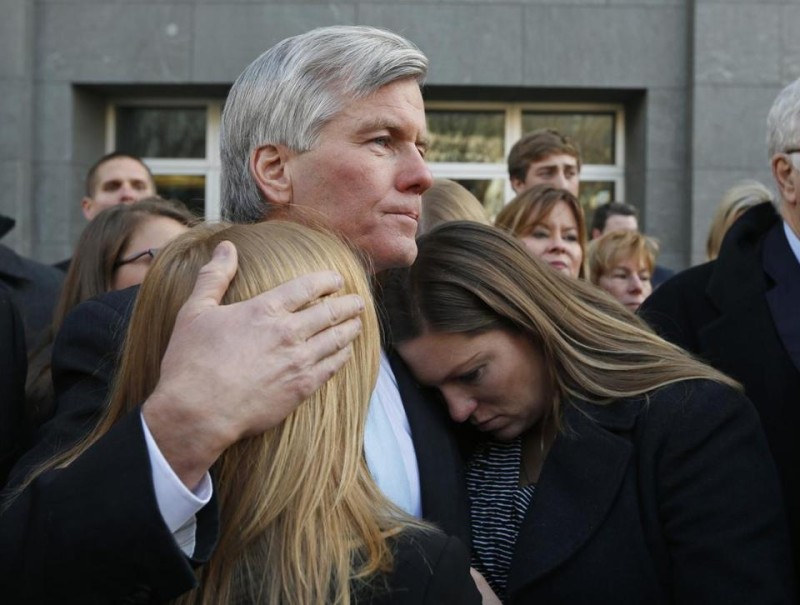RICHMOND, Va. — Bob McDonnell, the former governor of Virginia who was convicted in September on corruption charges, was sentenced to 24 months in prison on Tuesday in one of the most spectacular falls of a statewide elected official in the history of the commonwealth.
McDonnell, 60, was given the sentence by Judge James R. Spencer of US District Court. He was found guilty of trading favors in return for $177,000 in loans, vacations, and gifts from a wealthy family friend who was trying to promote his vitamin supplement business.
McDonnell, a Republican who was once considered a possible contender for the White House, initially faced the prospect of up to 20 years in prison, but Spencer lowered that range to 6½ to 8 years during a hearing. McDonnell’s lawyers, citing what they described as years of good works and commitment to public service, had argued that a sentence of community service should suffice.
While McDonnell and his family looked shocked when he was convicted, they appeared impassive on Tuesday as sentence was passed. He was directed to turn himself in Feb. 9.
For hour upon hour before the sentence, the court heard accounts of McDonnell’s good deeds, and the judge said they were a mitigating factor. But, he said: “A price must be paid. It breaks my heart.”
McDonnell, who arrived in court with two of his daughters, looked on silently through the hours of testimony from friends and former associates. He was the last to address the court.
“I stand before you as a heartbroken and humbled man,” he said, as many supporters in the packed courtroom dabbed at their eyes with tissues.
McDonnell said his life in the governor’s mansion had become unbalanced. Now, he said, he will dedicate the rest of his life “newly to service.”
Nearly 450 people, including McDonnell’s relatives and their friends, had written letters seeking leniency for Spencer. Some spoke of the former governor’s generosity with the homeless. Others noted his devotion to the Roman Catholic Church.
Most striking were the letters from McDonnell’s family members. One daughter, Jeanine McDonnell Zubowsky, wrote to Spencer blaming her mother, Maureen McDonnell, who was also convicted of various charges and is to be sentenced in late February.
Maureen McDonnell “has always been concerned about getting discounts or freebies,” Zubowsky wrote.
“This was one of the main reasons she would not communicate with him,” she said. “She hid her coordination with people for free or discounted things or services, and she didn’t communicate with my dad because she knew he would not approve.”
Zubowsky offered another reason for leniency, noting that she is to give birth to his grandchild soon.
McDonnell’s defense centered on his wife’s relationship with a Virginia businessman, Jonnie R. Williams Sr., whose company, Star Scientific, was under investigation by the Securities and Exchange Commission for possible security violations when federal prosecutors granted Williams immunity from those charges in exchange for his cooperation with the McDonnell inquiry.
Throughout the trial, defense lawyers portrayed the McDonnells as incapable of conspiring with Williams because the two had such a bad marriage. Williams gave the couple $120,000 in low-interest loans, paid for much of the wedding of their daughter Cailin McDonnell Young, bought a Rolex for the governor, picked up bills for golf outings, and lent them his Ferrari. McDonnell’s lawyers portrayed Maureen McDonnell as a “nutbag” so taken with Williams that she had lost general control of her office and marriage.
Spencer, referring to Williams, said Maureen McDonnell “may have let the serpent into the mansion.” But the governor, he said, let Williams into his financial affairs.
Upon release, McDonnell will face two years of supervision. The prison term and the supervision are all well below the recommended sentencing guidelines, which could have put the former governor behind bars for up to 20 years, and less than the 78 months sought by the government.
